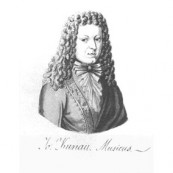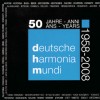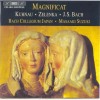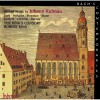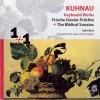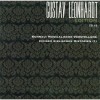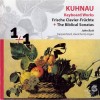Biography
Johann Kuhnau (6 April 1660 – 5 June 1722) was a German composer, organist and harpsichordist. He was the predecessor of Johann Sebastian Bach as Thomaskantor in Leipzig from 1701 to 1722.
Kuhnau was born in Geising, Saxony. He grew up in a religious Lutheran family. At age nine, he auditioned successfully for the Kreuzschule in Dresden. He sang in the Dresdner Kreuzchor and studied with Hering and Bental, later with Vincenzo Albrici
In 1680 he moved to Zittau, because Dresden was struck with the plague. He taught and worked in Zittau churches. Kuhnau studied French and Italian, and left translations from Hebrew, Greek, and Latin as well. Kuhnau also studied law, attaining the rank of advocate. In addition to composition, much of his time was spent as a lawyer, a poet, and a non-fiction author. He preceded Johann Sebastian Bach as cantor of the Thomaskirche (St Thomas Church) in Leipzig, directing the Thomanerchor from 1701 to 1722. He was also music director of the Paulinerkirche. In Leipzig Kuhnau taught Johann David Heinichen and Christoph Graupner. Kuhnau died in Leipzig on 5 June 1722.
Kuhnau wrote sacred music on Bible stories, such as The Marriage of David Gideon and The Tomb of Jacob. One of his organ works is titled Der todtkranke und wieder gesunde Hiskias (Hiskias, sick to death and healthy again). Kuhnau is credited as the inventor of the keyboard sonata, elevating the form from simple dance tunes. His Eine Sonata aus dem B (a sonata from the b flat) in three movements is the first known keyboard sonata. Kuhnau's secular vocal music is lost, but many of his sacred works have survived, including cantatas, motets, and four sets of keyboard pieces.
The Christmas cantata Uns ist ein Kind geboren, formerly attributed to Bach as BWV 142, is most likely composed by Kuhnau.





